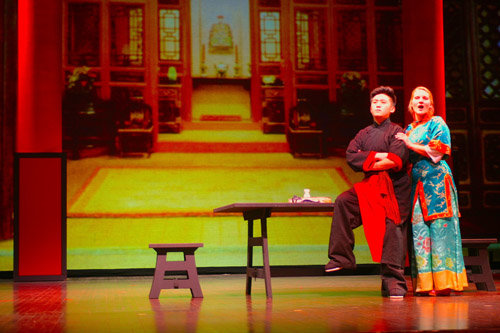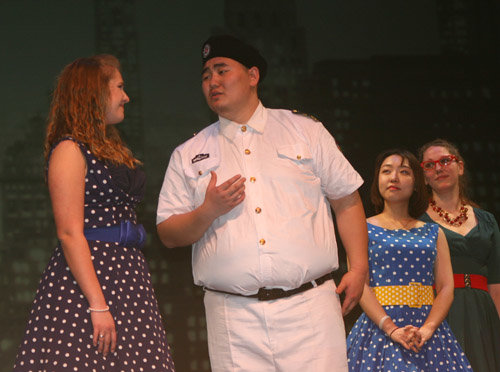
Sunday afternoon at MSU’s Fairchild Theatre, a stage full of singers, half of them American and the other half some Chinese, of danced away to the music of Leonard Bernstein, with the skyline of Manhattan projected behind them. The footwork was fine, but some of them some of them forgot the cherry on top — a jaunty Yankee tip of the hat.
Director Melanie Helton, watching from the back of the hall, didn’t have the patience to go through a translator this time.
“Da-da-da-da-da-da-da-da-da, hat!” she trilled through a loudspeaker.
“I think they got it,” she said to the translator.
This year, a 10-year-old program that brings together singers from MSU and Beijing’s China Conservatory of Music has reached its apotheosis: two full-on operas, one from each country.
The Chinese opera is “The Savage Land,” a moody, broody saga of love and revenge with a rich, Puccini-esque score. The American half is a salvo of exuberant, romantic tunes by Leonard Bernstein.
It’s a daring exercise in tension and release. The sweet strangeness of the result has to be seen to be grasped.
The opera world is already international by nature, but this is another level entirely. It makes your head spin when a Chinese soprano sings “I Am Easily Assimilated” from Bernstein’s “Candide,” affecting English with a Bulgarian accent and tossing off lines like “in Spain I am Spanish” with a slide of Ellis Island behind her.
The Bernstein revue stuffs a bouquet of tunes from “On the Town,” “West Side Story,” “Wonderful Town” and Bernstein’s only full-length opera, “A Quiet Place,” into a loose storyline that “sort of ends with world peace,” Helton said. For a big finish, the casts of both operas join for the tear-jerking “Make Our Garden Grow,” complete with bilingual calls for peace and love.
“I tell them it’s their ‘We Are The World’ moment, even though they’re too young to remember that,” Helton said.
Helton performed a similar revue, with Bernstein himself, as an undergraduate.
What would Bernstein have thought of Chinese sailors singing “New York, New York” and bounding off to Battery Park to pick up American women?
“He would have loved it,” she said.
Helton wanted all the “love couples” in the Bernstein revue to be Chinese/ American partners, a logistical nightmare that took her hours to work out.
The whole project is a mixed marriage. The MSU-Beijing vocal exchange program, brainchild of MSU professor of voice Richard Fracker, celebrates its 10th anniversary this year. Fracker and Helton decided it was time for a mashup with another annual uvula rite, MSU’s spring opera.
The MSU students spent last week in China, rehearsing and performing both operas. (The good will generated by the project may even offset Donald Trump’s threat of a 45 percent tariff on Chinese goods.)
“My favorite moment was when we met our Chinese counterparts,” said MSU soprano Quinn Rulison. “They gave us hugs instantly, there were no boundaries. You could feel the energy in the air.”
The last of three performances nearly filled Beijing’s 2,000-seat National Centre for the Performing Arts, which Helton called China’s equivalent of Carnegie Hall.
“Opening night, when we finished the big opening number, ‘New York, New York,’ the crowd went nuts,” MSU senior Aaron Petrovich said.
Rulison watched in amazement as the Chinese cast assimilated the raucous joy of Bernstein, building from solid dance moves (learned from a video of MSU stu dents) and painstaking phonetic memorization.
“It probably started with mimicking, but as soon as we were together, they definitely picked up on the American spirit and were able to convey it,” Rulison said. “Now that they’re here, it’s moving to another level of feeling.”

MSU singers faced the same daunting job learning “The Savage Land” by Chinese composer Jin Xiang, a master blender of Chinese and Western styles of music.
“It’s very loud and tuneful, and very range-y for the singers,” Helton said. “The baritone has multiple high A’s, which you wouldn’t hear even in Verdi.”
Not only do the MSU students have to sing the Mandarin text, there is also spoken dialogue, and that’s savage exposure. They got help from MSU grad student Zaikuan Song, a native of Beijing who first came to East Lansing from the Chinese side of the vocal exchange in 2012.
“In the singing part, we have a melody, so it sounds fine, but the dialogue sounded a little bit un-human, like a robot,” Song said. “The China Conservatory students helped them make it facile, bring emotion, change the pitch and make it alive.”
Song likes to describe music in colors. “‘The Savage Land’ is about revenge,” he said. “I’d color it red, the color of love and blood. It’s a sad story.”
The version used in the MSU-Beijing project, edited from two and a half hours down to one hour, was approved by Xiang before his death last December. Xiang’s widow attended one of the Beijing performances last week.
In Beijing, Song helped MSU students communicate with their Chinese counterparts, both on and off stage. This week, he’ll keep busy explaining the mysteries of Crunchy’s, HopCat and Pizza House to the Chinese cast.
“When we eat, I’m the one to tell them what food is in there,” he said. “It’s kind of like being a babysitter, but I enjoy it.”
“The Savage Land” and “Bernstein Lansing Sings America”
MSU Opera Theatre, China Conservatory of Music 7:30 p.m. Wednesday, March 23; 8 p.m. Friday, March 24-Saturday, March 25; 3 p.m. Sunday, March 27 $20/$18 seniors/$5 students Fairchild Theatre 542 Auditorium Road, East Lansing (517) 353- 5340, music.msu.edu
Support City Pulse - Donate Today!
Comments
No comments on this item Please log in to comment by clicking here